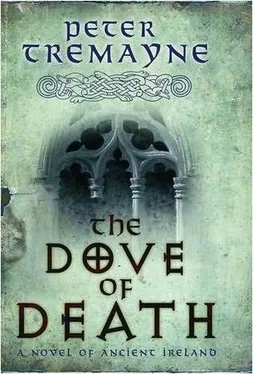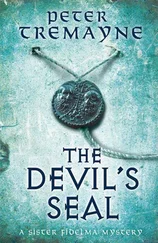Peter Tremayne - The Dove of Death
Здесь есть возможность читать онлайн «Peter Tremayne - The Dove of Death» весь текст электронной книги совершенно бесплатно (целиком полную версию без сокращений). В некоторых случаях можно слушать аудио, скачать через торрент в формате fb2 и присутствует краткое содержание. Жанр: Исторический детектив, на английском языке. Описание произведения, (предисловие) а так же отзывы посетителей доступны на портале библиотеки ЛибКат.
- Название:The Dove of Death
- Автор:
- Жанр:
- Год:неизвестен
- ISBN:нет данных
- Рейтинг книги:5 / 5. Голосов: 1
-
Избранное:Добавить в избранное
- Отзывы:
-
Ваша оценка:
- 100
- 1
- 2
- 3
- 4
- 5
The Dove of Death: краткое содержание, описание и аннотация
Предлагаем к чтению аннотацию, описание, краткое содержание или предисловие (зависит от того, что написал сам автор книги «The Dove of Death»). Если вы не нашли необходимую информацию о книге — напишите в комментариях, мы постараемся отыскать её.
The Dove of Death — читать онлайн бесплатно полную книгу (весь текст) целиком
Ниже представлен текст книги, разбитый по страницам. Система сохранения места последней прочитанной страницы, позволяет с удобством читать онлайн бесплатно книгу «The Dove of Death», без необходимости каждый раз заново искать на чём Вы остановились. Поставьте закладку, и сможете в любой момент перейти на страницу, на которой закончили чтение.
Интервал:
Закладка:
‘He was shocked by what occurred. He told me that he feels the need to redeem himself. I hope he succeeds.’
Eadulf sighed, then admitted, ‘Well, I am quite happy to leave behind some of our new friends. Unfortunately, we always seem to get acquainted with the bad people of the world.’ He glanced at her. ‘I know, I know. It is your task in life to seek out the wrongdoer and secure their punishment. So it is inevitable that we must encounter such people as Iuna — the Dove of Death.’ He shivered suddenly. ‘Such evil in a woman and in one so young.’ Then he said awkwardly to Fidelma, ‘Tell me, when you embarked on outlining the case against Budic and Riwanon, did you really do so knowing that you could not prove anything conclusively? That it was mostly circumstantial evidence?’
‘You will find in the Law of the Fénechus that indirect evidence can be used to argue before a Brehon. You can present this circumstantial evidence, and if the accused has a physical reaction to the evidence, whether he may tremble, blush, turn pale, develop a dry throat or display any other symptoms of nervousness, then the suspicion of guilt is strong.’
‘But not conclusive. Anyway, that may be so in Hibernia but what if Budic had not confessed?’
Fidelma smiled thinly, saying, ‘I am a lawyer and have to use the tools that the law allows me. In these circumstances, my strategy worked.’ She turned to regard Eadulf with her brows drawn together. ‘I thought that the law was also the task you were born to,’ she reproved softly. ‘You were a gerefa , a magistrate of your people. You had to dispense the law among them. Remember that was how we first met? It was because you were a gerefa of your people and I a dálaigh of mine that we were brought together in Hilda’s abbey.’
‘I abandoned being a gerefa when your countryman, Fursa, converted me to the Faith and I went to study in Tuam Brecain. I am a member of the religious now.’
She hesitated, wondering whether Eadulf was implying a censure for, technically, she too was a religious. But she would always describe herself as an advocate of the laws of her country first. Indeed, that had been her inward struggle for many years. She had never ceased to ask herself whether she should give up the symbols of religious life. That would not be difficult for her, as she had never really been committed to them. She decided to ignore his remark and return to her previous point.
‘Remember, in these travels, we meet not only the bad but also the good. We see not only the guilty but also the innocent.’
‘What concerns me is that even the good can produce evil,’ Eadulf announced reflectively, drawing himself up from the taffrail and staring towards the billowing sails above him.
‘What are you thinking about?’ she enquired, not sure of his meaning.
‘I was thinking of young Heraclius.’
‘Heraclius? I don’t understand. I thought that he was a very moral young man.’
‘But that invention of his, that thing that he calls the pyr thalassion or liquid fire — that is evil.’
‘He told me that it was really the invention of his father, Callinicus of Constantinopolis. That he merely tried to remember the formula.’
‘If an invention can be called evil, then this liquid fire is evil,’ repeated Eadulf.
‘It is not the invention that is evil, Eadulf, but merely the use men put it to.’
‘I suppose that is a philosophical argument. Yet if it had not been invented, men would not use it. I will agree that we could argue that when the first stick was sharpened into a point to use as a weapon, that was an evil thing. But the idea of hurling fire onto a ship — well…’He shuddered. ‘That must be the ultimate weapon.’
‘But not a new one,’ Fidelma replied. ‘I had a long talk with Heraclius. While his weapon was more efficient, he told me that another countryman of his called Proclus Oneirocrites, set an entire fleet on fire when he was helping his King, Anastasius, to defeat a rebellion against him. It happened nearly a century and a half ago. Some say that he used the power of the sun, directed by mirrors, and some say that he used sulphur and hurled it burning onto the ships.’
‘Well, this Greek Fire frightens me — the idea of the mass destruction that it can cause. Let us hope its knowledge will remain with those of good intent, for if it ever falls into evil hands…’
‘There can never be a guarantee of that,’ Fidelma replied. ‘At least, it is not something we have to worry about in the Five Kingdoms. So let us relax and enjoy the voyage back to Aird Mhór.’
‘And how long will it be before we have to start our travels again?’
Fidelma had the impression that Eadulf spoke the words without meaning to. They had come automatically to his lips.
She turned and placed a hand on his arm, saying, ‘I am hoping that we shall be there a while. I know we have been a long time travelling, so long that I wonder if we will recognise little Alchú.’
Eadulf’s voice held bitterness in its tone.
‘It is not our recognition of the boy that concerns me,’ he said. ‘It is whether the boy will recognise us.’
Fidelma bit her lips. Eadulf was right, of course; she knew it and resented it. She was aware that she always placed her calling as an advocate of the laws of Éireann before all other considerations. But that had ever been, since she had left the school of the Brehon Morann to make her way in the world. Her cousin, Abbot Laisran, had persuaded her to join the religious at Cill Dara. Most of those who followed the professions had entered the religious, for they saw it as indispensable security to their callings — doctors, lawyers, chroniclers and so on. But when it came to a choice between obedience to the Abbess and obedience to the law, Fidelma chose the law. She was no religious at heart. She knew it. She even challenged some of the basic dogmas of the Faith where she felt they needed it.
So perhaps now was a time to cease this questioning of her motives? There was still a secular professional class among her people. She felt that her cousin Abbot Laisran had ill-advised her. Her life, she had discovered, did not rely on being protected by a religious community. She found the new ideas coming from Rome — that all should obey the set rules that most people felt alien to their philosophies — was not a path she wanted to continue on. Was it too late?
‘You seem deep in thought.’ Eadulf’s voice awoke her from her reverie.
‘I was thinking about what you said.’
‘I just want our son to grow up knowing something of his parents.’
‘Of course. I want the same.’ Fidelma coloured a little. She had begun asking herself what her true ambition in life was, and had realised that her greatest joy was her pursuance of the law. The religious life counted as little compared with that.
‘Perhaps, when we return to Cashel, we should spend time talking about the future?’ ventured Eadulf.
He was a little surprised when she agreed readily. He gazed thoughtfully at her.
‘That is good. We have travelled enough in one life. Now is the time to settle and become more reflective and, perhaps, find a retreat in that little mixed community at the Abbey of the Blessed Ruan, north of Cashel. What was it called? The oak-grove of…?’
He broke off with a sigh when he realised that Fidelma was no longer listening. Her eyes seemed focused somewhere on the misty waters of the grey sea before her.
Had he but known, Fidelma’s thoughts were actually running the opposite course to Eadulf’s.
She was not thinking of settling down in a mixed religious community to reflect on the Faith. In fact, she was thinking about leaving the religious altogether and taking her place in the role that she had, unofficially, long since filled. That was the role as the legal advisor to her brother, Colgú, King of Cashel.
Читать дальшеИнтервал:
Закладка:
Похожие книги на «The Dove of Death»
Представляем Вашему вниманию похожие книги на «The Dove of Death» списком для выбора. Мы отобрали схожую по названию и смыслу литературу в надежде предоставить читателям больше вариантов отыскать новые, интересные, ещё непрочитанные произведения.
Обсуждение, отзывы о книге «The Dove of Death» и просто собственные мнения читателей. Оставьте ваши комментарии, напишите, что Вы думаете о произведении, его смысле или главных героях. Укажите что конкретно понравилось, а что нет, и почему Вы так считаете.











